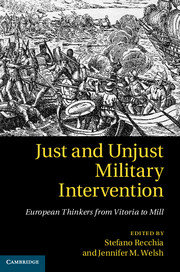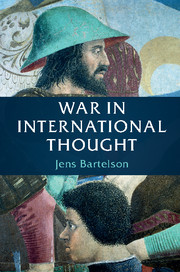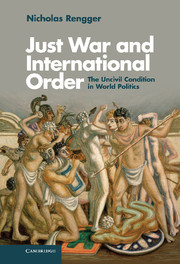Just and Unjust Military Intervention
Classical arguments about the legitimate use of force have profoundly shaped the norms and institutions of contemporary international society. But what specific lessons can we learn from the classical European philosophers and jurists when thinking about humanitarian intervention, preventive self-defense or international trusteeship today? The contributors to this volume take seriously the admonition of contextualist scholars not to uproot classical thinkers’ arguments from their social, political and intellectual environment. Nevertheless, this collection demonstrates that contemporary students, scholars and policymakers can still learn a great deal from the questions raised by classical European thinkers, the problems they highlighted, and even the problematic character of some of the solutions they offered. The aim of this volume is to open up current assumptions about military intervention, and to explore the possibility of reconceptualizing and reappraising contemporary approaches.
- The first study to discuss classical European thought specifically on military intervention
- Brings history to life with direct connection to contemporary debates
- Includes original and accessible essays by some of the world's leading scholars
Reviews & endorsements
"Beyond these uncertainties, there is enough scope to revisit the views of classical political thinkers in light of contemporary debates on intervention, which they often echo and enlighten. Mill’s thoughts on (and general reluctance towards) intervention are extraordinarily relevant in view of the debates which have raged over Kosovo, Iraq, Afghanistan and Libya. That consideration is enough to fully justify the project, and the resulting book is, by any measure, a remarkable accomplishment."
Gilles Andréani, Survival
"… offers a series of finely worked discussions on how figures such as Francisco de Vitoria, Hugo Grotius, Emmerich de Vattel and John Locke, among others, tackled the moral issues raised by the use of force to rescue oppressed peoples from the predations of their own government. … Setting a gold standard for edited collections, Just and Unjust Military Intervention will surely and deservedly be seen a landmark text in its field."
Cian O’Driscoll, International Affairs
Product details
November 2013Hardback
9781107042025
317 pages
235 × 157 × 20 mm
0.58kg
Available
Table of Contents
- Introduction: the enduring relevance of classical thinkers Stefano Recchia and Jennifer Welsh
- 1. Intervention in European history, c.1520–1850 David Trim
- 2. War in the face of doubt: early modern classics and the preventive use of force Ariel Colonomos
- 3. Vitoria: the law of war, saving the innocent, and the image of God William Bain
- 4. Grotius, Hobbes and Pufendorf on humanitarian intervention Richard Tuck
- 5. John Locke on intervention, uncertainty, and insurgency Samuel Moyn
- 6. Intervention and sovereign equality: legacies of Vattel Jennifer Pitts
- 7. David Hume and Adam Smith on international ethics and humanitarian intervention Edwin Van de Haar
- 8. Sovereignty, morality and history: the problematic legitimization of force in Rousseau, Kant and Hegel Pierre Hassner
- 9. Revisiting Kant and intervention Andrew Hurrell
- 10. Edmund Burke and intervention: empire and neighborhood Jennifer Welsh
- 11. The origins of liberal Wilsonianism: Giuseppe Mazzini on regime change and humanitarian intervention Stefano Recchia
- 12. J. S. Mill on non-intervention and intervention Michael Doyle.








